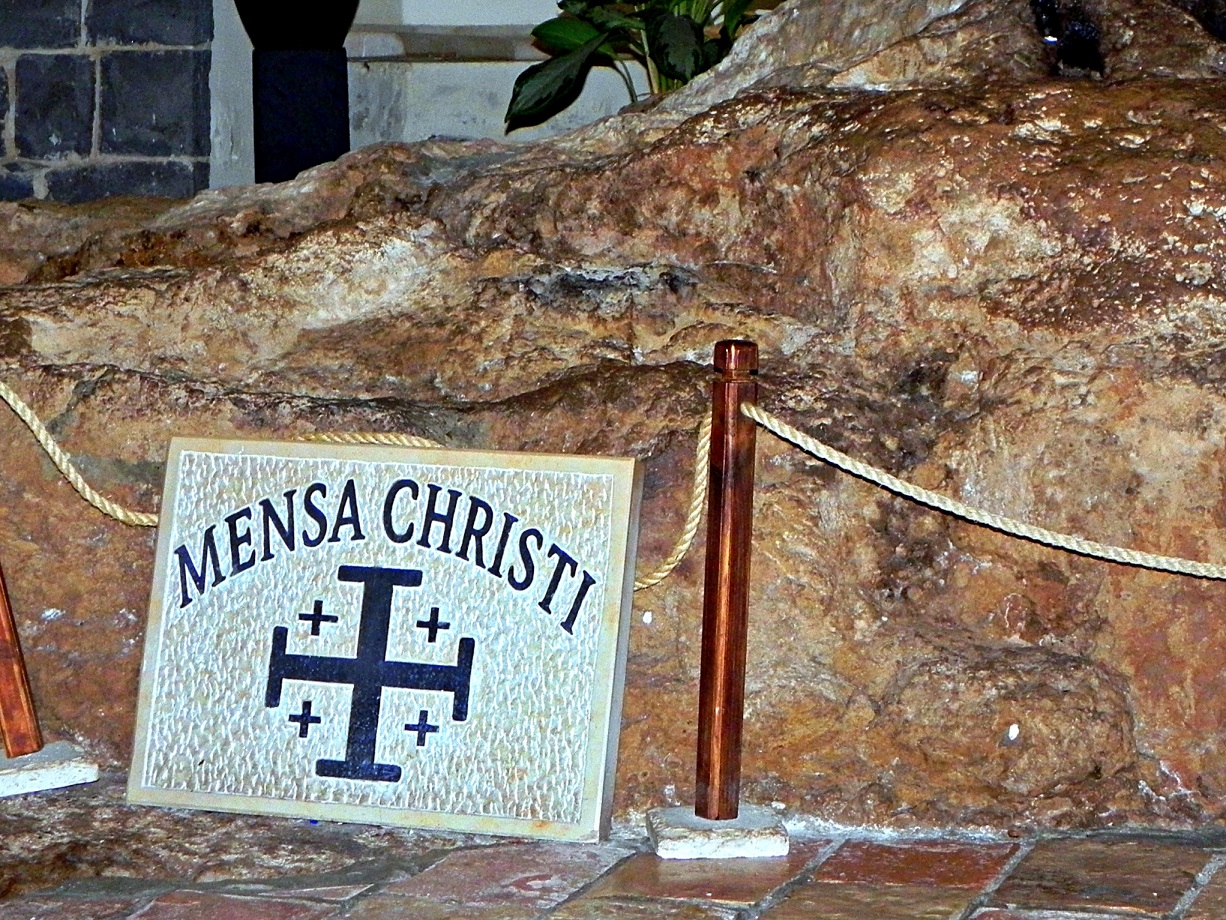#TomorrowIsSunday (EN+ES) | What rebuilds a relationship with Jesus?


Mensa Christi - the rock at the Church of the Primacy of St. Peter where the Risen Jesus prepared breakfast for the disciples. PhotoCredit: Sr. Amata CSFN
Third Sunday of Easter, Year C
Sunday, May 1, 2022
Gospel of John 21: 1-19
EN https://bible.usccb.org/es/bible/lecturas/050122.cfm
You can download the commentary on the Gospel and beautiful photos:
https://www.academia.edu/78073457/What_rebuilds_a_relationship_with_Jesus?source=swp_share
*
III Domingo de Pascua, Año C
Domingo, 1 de mayo del 2022
Evangelio de Juan 21,1-19
ES https://bible.usccb.org/es/bible/lecturas/050122.cfm
1 The most important question
After the resurrection we have only very brief statements from Jesus. Each one is invaluable because it reveals what is most important. In the longer version of today’s Gospel, Jesus asks the most important question to the first of the Apostles. The original Greek text of the Gospel gives more depth to this question than the translations. So let’s take a look at the original version.
2 Key Words
When they climbed out on shore, they saw a charcoal fire.
Before we even focus on the key question it is worth noting another important detail. Jesus asks Peter the question after he has prepared breakfast for the disciples over a fire of “charcoal” (anthrachia). This detail reminds us of another event at the fire. Before Jesus’ passion and death, Peter denied Jesus while warming himself at a fire also made of “charcoals” (anthrachia) in the courtyard of Annas (see John 18:18).
Simon, son of John, do you love (agapao) me more than these?
He answered him, Yes, Lord, you know that I love(fileo) you.
Jesus addresses Peter by the name he had before he became His disciple and rock: “Simon. son of John.” He asks him three times if he loves him. As many times as Peter denied Jesus. In this way, Jesus healed Peter spiritually of his betrayal. By repenting and professing love three times, Peter rebuilt a relationship with Jesus.
The information about what that relationship was is recorded in the words of the original Greek Gospel.
Jesus asks “do you love (agapao) me?” The word “agapao” means love that is capable of giving one’s life for a loved one, the highest degree of love. Peter replies: “Yes, Lord, you know that I love you (fileo)”. The word “fileo” describes the love of friends, that is, not the greatest love. Jesus is not discouraged and asks again, but receives a similar answer:
“Simon, son of John, do you love me (agapao) more than these?”
Simon Peter answered him, “Yes, Lord, you know that I love you(fileo).”
This shows Jesus’ invitation not only to friendship, but to the greatest relationship of love. Peter, however, is as usual sincere and aware of his weaknesses, so he replies that he loves Jesus with the love of a friend. The Master accepts this and lowers himself to the level of a human being, and for the third time no longer uses the word “agapao”, but “fileo”.
“Simon, son of John, do you love me?” (fileo)
“Lord, you know everything; you know that I love you.” (fileo).
Although, at this stage Jesus’ imperfect love is enough at this time, He says, “Simon. son of John.” He asks him three times if he loves him. As many times as Peter denied Jesus. In this way, Jesus healed Peter spiritually of his betrayal. By repenting and professing love three times, Peter rebuilt a relationship with Jesus.
The information about what that relationship was is recorded in the words of the original Greek Gospel.
Jesus asks “do you love (agapao) me?” The word “agapao” means love that is capable of giving one’s life for a loved one, the highest degree of love. Peter replies: “Yes, Lord, you know that I love you (fileo)”. The word “fileo” describes the love of friends, that is, not the greatest love. Jesus is not discouraged and asks again, but receives a similar answer:
Simon, son of John, do you love) meg? (agapao
He answered him, Yes, Lord, you know that I love you (fileo).
This shows Jesus’ invitation not only to friendship, but to the highest relationship of love. Peter, however, is as usual sincere and aware of his weaknesses, so he replies that he loves Jesus with the love of a friend. The Master accepts this and lowers himself to the level of a human being and for the third time no longer uses the word “agapao”, but “fileo”.
Simon, son of John, do you love (fileo) me”?
Lord, you know everything, you know that I love you (fileo).
Although Peter’s imperfect love is enough for Jesus at this stage, Peter will mature into perfect love. He will lay down his life for Jesus in Rome.
3 Today
At the site of Peter’s confession of love by the Sea of Galilee, there are stones in the form of hearts. They are not only a reminder of what once took place. They remind us of Jesus’ question to each of us: Do you love me (agapao)? Do you love (fileo) me”?

Church of the Primacy of St. Peter by the Sea of Galilee (Tabgha). PhotoCredit: Sr. Amata CSFN
*
1 La pregunta más importante
Después de la Resurrección tenemos discursos muy breves de Jesús. Cada uno de ellos tiene un valor incalculable porque revela lo que es más importante. En la versión más larga del Evangelio de hoy, Jesús hace la pregunta más importante al primero de los Apóstoles. La versión griega original del Evangelio incluye el contenido más profundo de esta pregunta que las traducciones. Así que veamos la versión original.
2 Palabras clave
«Tan pronto como saltaron a tierra, vieron unas brasas»
Antes de centrarnos en la pregunta clave, conviene señalar otro detalle importante. Jesús hace la pregunta a Pedro después de haber preparado el desayuno de los discípulos sobre una hoguera de “brasas” (gr. anthrachia). Este detalle nos recuerda otro acontecimiento de la hoguera. Antes de la pasión y muerte de Jesús, Pedro negó a Jesús calentándose en la hoguera también de “brasas” (gr. anthrachia) en el patio de Anás (véase Juan 18:18).
«Simón, hijo de Juan, ¿me amas (gr. agapao) más que éstos?
Él le respondió: Sí, Señor, tú sabes que te amo (gr. fileo). »
Jesús se dirige a Pedro por el nombre que tenía antes de convertirse en su discípulo y su roca: “Simón, hijo de Juan”. Le pregunta tres veces si le quiere. Tantas veces cuantas veces Pedro negó a Jesús. De este modo, Jesús curó espiritualmente a Pedro de su traición. Al arrepentirse y profesar su amor tres veces, Pedro reconstruyó su relación con Jesús.
La información sobre esta relación está registrada en las palabras del Evangelio griego original.
Jesús pregunta “¿me amas (gr. agapao)? La palabra “agapao” significa amor capaz de dar la vida por un ser querido, el más alto grado de amor. Pedro responde: “Sí, Señor, tú sabes que te amo (gr. fileo)”. La palabra “fileo” describe el amor de los amigos, es decir, no es el amor más profundo. Jesús no se desanima y vuelve a preguntar, pero recibe una respuesta similar:
«Simón, hijo de Juan, ¿me amas (gr. agapao)?
Él le respondió: Sí, Señor, tú sabes que te amo (gr. fileo). »
Esto muestra la invitación de Jesús no sólo a la amistad, sino a la más profunda relación de amor. Pedro, sin embargo, es como siempre sincero y consciente de sus debilidades, por lo que responde que ama a Jesús con el amor de un amigo. El Maestro lo acepta y se rebaja al nivel de un ser humano y por tercera vez ya no utiliza la palabra “agapao”, sino “fileo”.
«Simón, hijo de Juan, ¿me amas (gr. fileo)?
Señor, tú lo sabes todo, tú sabes que te amo (gr. fileo). »
Aunque el amor imperfecto es suficiente para Jesús en esta etapa, Pedro madurará hasta llegar al amor perfecto. En Roma dará su vida por Jesús.
3 Hoy
En el lugar de la confesión de amor de Pedro junto al Mar de Galilea hay piedras en forma de corazón. No sólo son un recuerdo de lo que una vez tuvo lugar. Nos recuerdan la pregunta de Jesús a cada uno de nosotros: ¿Me amas (gr. agapao)? ¿Me amas (gr. fileo)”?

View of the Sea of Galilee through the window of the Church of the Primacy. PhotoCredit: Sr. Amata CSFN
You can read also:
#TomorrowIsSunday (EN+ES) | Why is this Sunday Compared to a “Second Baptism”? >>>
#TomorrowIsSunday (EN+ES) | Jesus’ greatest miracle >>>
#TomorrowIsSunday | What does Jesus write in the sand? >>>
#TomorrowIsSunday (EN+ES) | What is the scandal of mercy? >>>
#TomorrowIsSunday (EN+ES) | Why Does Jesus Pray? >>>
#TomorrowIsSunday (EN+ES) | What Should One Do when Tempted? >>>
#TomorrowIsSunday (EN+ES) | What Do a Hypocrite and a Mask Have in Common? >>>
#TomorrowIsSunday (EN+ES) | Why should we love our enemies? >>>
#TomorrowIsSunday (EN+ES) | Jesus’ Counsel Regarding Hatred Prompted by Faith >>>
#TomorrowIsSunday (En+ES) | In the Bible, what does it mean to be “fisher of men”? >>>
#TomorrowIsSunday (EN+ES) | Why is Nazareth a Tragic City? >>>
#TomorrowIsSunday (EN+ES) | Who is Theophilus for whom Luke wrote the Gospel? >>>



Dodaj komentarz